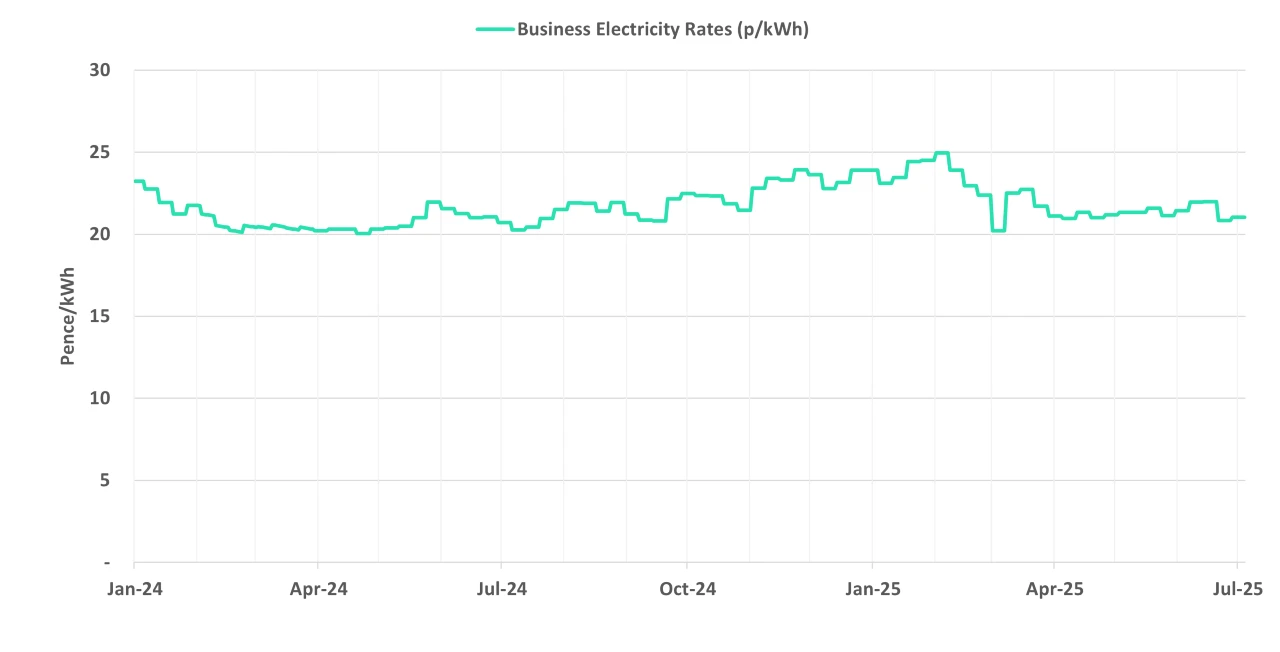Best business electricity rates | July 2025
Compare July 2025 Electricity Rates & Save up to 45% Today
Just enter your business postcode…
Compare July 2025 Electricity Rates & Save up to 45% Today
Just enter your business postcode…
We present the average one-year fixed business electricity prices currently offered by our panel of trusted energy suppliers.
| Size | Annual Consumption kWh | 1 Year fixed elec rate p/kWh |
|---|---|---|
| Small | 10,000 to 50,000 | 23.0 |
| Medium | 50,000 to 100,000 | 21.0 |
| Big | 100,000 + | 20.8 |
These prices reflect the average for British businesses. Business electricity rates depend on annual consumption, region, and connection capacity. Get bespoke rates for your business today.
Source info: Our business electricity prices data has been compiled using:
The average business electricity prices in 2025. The table below shows the average one-year fixed business electricity rates offered in 2025 compared to those over the previous three years.
| Size | Annual Consumption kWh | 2022 average rates p/kWh | 2023 average rates p/kWh | 2024 average rates p/kWh | 2025 average rates p/kWh |
|---|---|---|---|---|---|
| Small | 10,000 - 50,000 | 53.37 | 27.29 | 23.51 | 24.20 |
| Medium | 50,000 - 100,000 | 51.37 | 25.30 | 21.49 | 22.20 |
| Big | 100,000 + | 51.17 | 25.09 | 21.30 | 22.00 |
Data source: The information above is based upon the latest published wholesale electricity rates published on the ICE exchange and average non-commodity costs measured using AquaSwitch quoting data.
Here is a graph with current commercial electricity rates per kWh and how they’ve changed during 2025. Our experts update this graph weekly based on the latest wholesale electricity prices.

Source: Wholesale electricity rates on the National Grid published by the ICE exchange.
Small business electricity prices typically include a fixed unit rate per kWh of electricity consumed and a daily standing charge.
At AquaSwitch, we offer a free, no-obligation comparison service to help you find the best small business electricity rates on the market. Here’s how it works:

Enter your postcode, along with a few details about your commercial property, and we’ll search the market for the latest prices.

Compare your renewal quote against the best business electricity prices offered by our panel of suppliers to see how much your business could save.

Our experts will manage a seamless transition of your electricity tariff to your new supplier, ensuring you benefit from lower business electricity rates.
Before COVID-19 and the conflict in Ukraine, government publications reported that most businesses paid less than 10 pence per kWh for electricity. Unfortunately, these historically low prices are no longer available due to the continued restriction of Russian gas supplies into Europe.
In 2025, a good rate for business electricity is between 20 and 23 pence per kWh.
The electricity market is volatile, with prices changing daily. Use our business energy comparison service to request quotes from our trusted suppliers and secure the best business electricity rates available today.
Over the past year, business electricity prices have remained persistently high at around 20 pence per kWh.
Electricity prices remain high due to the national grid’s reliance on expensive natural gas imports. Approximately a third of Britain’s electricity is generated using natural gas imported from:
Market analysts anticipate that business electricity prices will remain largely unchanged for the remainder of 2025 and into the first half of 2025.
Although business electricity prices are expected to remain stable in 2025, global events, such as escalations in the conflicts in Ukraine and Gaza, could rapidly increase energy prices again.
All business electricity rates include a charge for each kWh of electricity consumed at a commercial property.
Our latest business electricity prices table displays the current market rate for 1 kWh of electricity.
The following factors influence the unit rate per kWh in business electricity tariffs:
We recommend requesting tailored quotes based on your specific address and energy consumption to get accurate and up-to-date information on business electricity prices. Start by entering your postcode above.
This section summarises the four types of business electricity rates typically included within business energy contracts.
In all business electricity tariffs, the amount you pay depends on how much electricity your company consumes, as recorded by meter readings.
The electricity unit rate is shown in pence per kilowatt-hour (kWh). For example, it could be 25p/kWh.
Your electricity unit charge will be calculated by multiplying the kWh of electricity used by the unit rate defined in your contract.
A standing charge is a fixed daily fee on your electricity bills regardless of your electricity consumption.
A fixed standing charge covers maintaining your connection to the local electricity distribution network and renting your business energy meter.
The standing charge is quoted in pence per day. For instance, 30p/day. For more information, here’s our complete guide to the business energy standing charge.
Capacity charges are incurred by any business equipped with a half-hourly electricity meter.
These charges are levied by your local electricity distribution network provider to ensure a guaranteed power capacity for your electricity supply, measured in kVA (kilo-volt-amps).
The capacity charge on your business electricity bill will be listed as a fixed daily charge per kVA of maximum import capacity on your business energy connection.
Please refer to our guide on maximum demand meters for further information.
The UK government levies two taxes on top of business electricity charges, as follows:
These additional charges will appear as separate lines on a business electricity bill and are paid directly to your business electricity supplier.
💡In small business energy companies are exempt from the CCL and pay VAT at the reduced rate of 5%.
Understanding your business electricity bill can be complicated. On the final page of your bill, your supplier will give you a ‘details of charges’ section showing how each element of your business electricity rates has been calculated.
To help demonstrate how business electricity rates work, our in-house experts have built a handy business electricity rates calculator below. Start by entering a few details about your business electricity supply.
Business electricity charges paid to your commercial electricity supplier have five separate elements. Our business electricity rates calculator will assess each based on your inputs.
Click each link for more information:
Get the best business electricity rates from our UK-based experts
Just enter your business postcode…
Start saving now
Commercial electricity rates are unpredictable, changing daily due to fluctuations in the energy markets.
Despite the uncertainty of future prices, there are two key things to know about business electricity rates:
The table below shows the difference between available fixed contracts and out-of-contract rates:
| Contract type | Unit charge per kWh | Daily standing charge |
|---|---|---|
| Available fixed contracts | 20 - 25 p/kWh | £0.40 to £1.00 |
| Published deemed rates | 35 - 40 p/kWh | £2.00 to £3.00 |
Source: Published deemed business electricity rates for non-half-hourly non-domestic customers reviewed in July 2024.
If your fixed business electricity rate has expired, we recommend comparing business electricity rates to secure significantly lower rates.
Yes, business electricity prices depend on where your commercial property is located in the country.
Britain has six distribution network operators (DNOs), each operating its own local network of power cables, substations and transformers.
Included within business electricity rates are the distribution costs charged by the local DNO. Some DNOs are more expensive than others, making business electricity prices dependent upon your region.
Businesses can benefit from cheaper evening off-peak rates if they have one of the following energy meter types that supports measuring electricity consumption at different times of the day:
It is also necessary to have an off-peak tariff with your business electricity supplier.